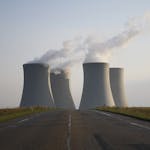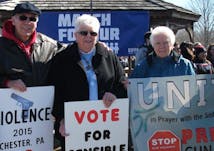What is DU?
- Uranium that’s left after it has been mined and processed to extract the portion usable for nuclear power
- The highly radioactive part that is discarded
What is DU Used For?
 Its radioactive properties have prevented all practical usage with the exception of military weaponry. Although uranium ore can be converted into a gas, this increases its radioactivity and toxicity. The gas can then be converted into metal for uses in reactors and weapons. Alliant Techsystems (ATS), the primary producer of weapons-grade DU for the military, uses DU uranium as a replacement for tungsten in making armor-piercing shells, bomb casings, tank armor plating, and antipersonnel mines. When DU is in contact with extremely high temperatures, as it is when used in weapons, it becomes more deadly.
Its radioactive properties have prevented all practical usage with the exception of military weaponry. Although uranium ore can be converted into a gas, this increases its radioactivity and toxicity. The gas can then be converted into metal for uses in reactors and weapons. Alliant Techsystems (ATS), the primary producer of weapons-grade DU for the military, uses DU uranium as a replacement for tungsten in making armor-piercing shells, bomb casings, tank armor plating, and antipersonnel mines. When DU is in contact with extremely high temperatures, as it is when used in weapons, it becomes more deadly.
Where Are DU Weapons Used?
- Initially used in the first Gulf War, DU weapons have since been used in conflicts in Bosnia, Kosovo, Afghanistan, and, currently, in Iraq. Any soldier or civilian who comes in contact with targets or equipment hit by DU shells are at risk of contamination.
- Government studies to determine exposures and long-term health consequences are woefully, and possibly, purposely inadequate. Consider this:
- Gulf War Syndrome (affected approximately 30% of soldiers in first Gulf War) is likely the result of exposure to many toxic materials, including DU.
- In the current Gulf War, it’s estimated that 40% to 50% of soldiers will suffer the same symptoms. The Iraqi population in these contaminated areas—including children who play with spent shells and on bombed-out vehicles—are unaware of the danger posed by DU.
- Microscopic DU particles (in dust or aerosol form) can contaminate air, ground, water, and food, compromising crops and animals that feed in affected areas.
What is Being Done?
Tens of thousands of activists and dozens of organizations and coalitions have spoken out against the production and use of depleted uranium. This includes:
- Rosalie Bertell, PhD, a Grey Nun of the Sacred Heart, and a world-renowned expert on radiation and its effects
- The Office of Corporate Social Responsibility of the Sisters of St. Francis of Philadelphia
About Rosalie Bertell, GNSH:
She lives in Yardley, PA, and works in the field of environmental epidemiology. She has served as a consultant on the President’s Commission at Three Mile Island and on the International Commission investigating the nuclear disaster at Chernobyl and the toxic gas leak at the Union Carbide plant in Bhopal, India.
Books by Rosalie Bertell:
Handbook for Estimating the Health Effects of Ionizing Radiation No Immediate Danger: Prognosis for a Radioactive Earth
Planet Earth: The Latest Weapon of War
For more information about Corporate Social Responsibility, contact us.







